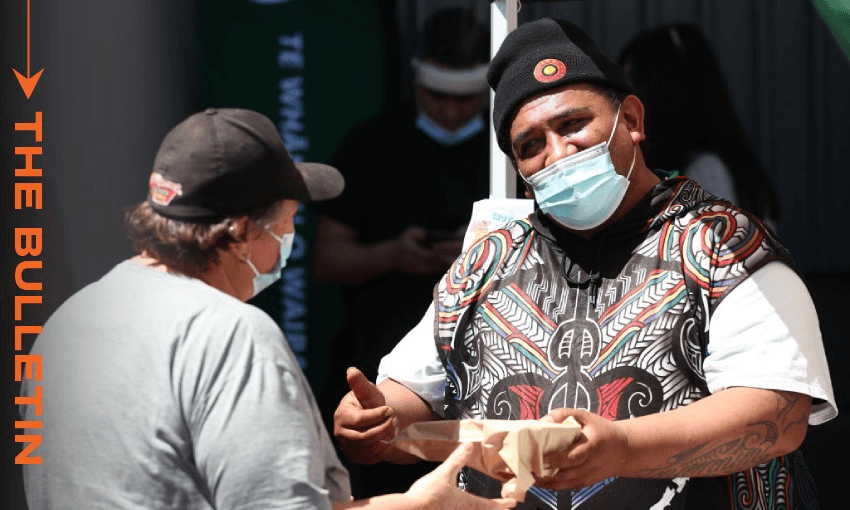The bill to disestablish the authority will have its final reading this morning under urgency as the health minister paints ‘a different dream’ but has scant detail on what might replace it, writes Anna Rawhiti-Connell in this excerpt from The Bulletin, The Spinoff’s morning news round-up. To receive The Bulletin in full each weekday, sign up here.
Bill to disestablish Te Aka Whai Ora set to pass this morning
On July 1, 2022, a new era was heralded for the health system as Te Whatu Ora and Te Aka Whai Ora came into being. At the time, there was an acknowledgment of the challenges ahead and the time it would take for the reforms to ease well-documented strain and crisis within the health system. There was also hope. Te Whatu Ora has since its original name deemphasised, with primacy now given to the English version, Health NZ. Te Aka Whai Ora, the Māori Health Authority (MHA) will cease to exist, with the final reading of the bill to disestablish it planned for this morning. Stewart Sowman-Lund reports on a charged day in the House. Opposition parties held little back in expressing their anger at the move and the use of urgency to get the bill through. This morning, Shanti Mathias explains what urgency means in the parliamentary context, why its used and why its use is being criticised.
Smokefree laws also on the slate for repeal this week
Toby Manhire spoke to the then-freshly appointed heads of both entities, Margie Apa and Riana Manuel, in July 2022. Manuel, Te Aka Whai Ora’s chief executive, said the MHA would address the inequities and failures exposed during the pandemic and throughout the Wai 2575 Waitangi Tribunal claim inquiry. The 2019 Waitangi Tribunal report into health services for Māori was described as a game-changer by Te Aka Whai Ora board member Dr Mataroria Lyndon in a story on The Spinoff last December last year. It recommended the creation of a Māori health authority, a recommendation that also came from the health and disability system review report in 2020. Both shone further light on a system that results in Māori dying on average seven years earlier than non-Māori, dying at twice the rate of non-Māori from cardiovascular disease and being more likely to be diagnosed and die from cancer. The smokefree laws introduced by the previous government are also on the slate for repeal this week. Modelling published on NZ Doctor late year suggested those laws would save thousands of lives, particularly by reducing the heavy burden smoking places on Māori.
‘A different dream’
As far as how the Tribunal’s substantive findings and the well-documented inequities will be addressed, health minister Dr Shane Reti has yet to provide a lot of detail. Speaking to reporters before heading into the House, Reti said he wanted to wait until he was in the House before laying out his vision, saying he liked oratory and “adding context and contour to the statements I’m going to make”. He did talk to a few details saying the funding for Māori health would remain the same. In the House, he went on to say, “While the particular version of the dream that the Māori Health Authority laid out is coming to an end today, I want to paint a different dream, one that will be outcomes driven, providing greater devolved decision-making that will deliver care as close to the home and the hapū as possible.”
Te Aka Whai Ora signs off
As far as detail goes, Reti said Te Aka Whai Ora’s “staff and functions will transfer mostly to Health New Zealand, with a few to the Ministry of Health”. He said it wasn’t “simply a rehoming of the Māori Health Authority within Health NZ and the Ministry of Health” and that there will be fewer funded positions transferred across, citing unfilled roles currently being covered by “expensive consultants.” The authority itself posted something of a sign-off on social media and its website yesterday with Manuel thanking staff and hauora Māori partners. The statement said that “work to transition our kaimahi is expected to be completed by 31 March, and our organisation will be officially disestablished by 30 June 2024.” Te Aka Whai Ora Chair Tipa Mahuta says she has full confidence that the mission to improve Māori health outcomes will endure. “Te Aka Whai Ora originated from the self-determination of whānau, hapū and iwi, and the advocacy of rangatira and Māori leaders from across the motu.”


